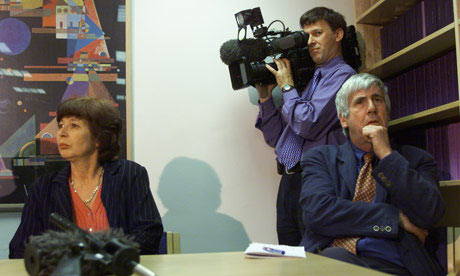
In October 1761, Marc-Antoine Calas, the son of a Protestant cloth merchant in Toulouse, was found dead in his father's shop shortly after dining on pigeon, chicken, grapes and Roquefort with his family in their home upstairs. The father, Jean Calas, initially claimed the body was lying on the floor, before admitting they had found Marc-Antoine hanging from a rope. He was tried for murder, continued to protest his innocence despite being tortured, and was paraded through the streets and publicly strangled on the day after the guilty verdict. His supposed motive was fear that Marc-Antoine would convert to Catholicism to advance his career.
Voltaire, the playwright, novelist, philosopher, satirist, polemicist and historian, was by then living near Protestant Geneva and became convinced that a miscarriage of justice had taken place after meeting Donat Calas, a brother of Marc-Antoine who had been elsewhere on the night of his death. He lobbied allies at court, met Calas's widow, Anne-Rose, produced a pamphlet with her and Donat, and guided their campaign for the verdict to be re-examined. A pamphlet produced in his own name, Treatise on Tolerance, linked Calas's conviction and the anti-Huguenot prejudice that lay behind it to intolerance in general. A retrial was ordered by the king's council, and in March 1765 Calas's name was cleared and the co-accused – including Anne-Rose – acquitted and compensated.
This was the original cause celebre in which a writer sought to right a judicial wrong done to an individual, and it seems likely that it inspired an even more famous French instance, the novelist Emile Zola's intervention in the Dreyfus affair. Alfred Dreyfus, a Jewish artillery officer, was convicted in trials in 1894 and 1896 of passing military secrets to the German embassy, on the basis of evidence later shown to be faked. Although others did the necessary detective work, Zola alerted the public to the framing and its cover-up with J'Accuse!, an open letter to the French president published in a Paris newspaper in 1898. He achieved his objective of being tried for libel, with the resulting publicity leading to a review of Dreyfus's conviction that eventually exonerated him.
Britain has no Voltaire or Zola; instead, starting with Defoe and Fielding and continuing with Dickens, it has a tradition of novelists who campaign for reform or against social evils, rather than taking up the cudgels on behalf of individuals. Here it has usually been print or TV journalists, as well as lawyers, who have fought to expose miscarriages of justice, with Ludovic Kennedy the closest to Voltaire in that his most celebrated investigations battled for posthumous pardons. Ten Rillington Place (1961) secured a pardon for Timothy Evans – and aided campaigners against the death penalty – by arguing against his conviction for murdering his baby daughter, fingering the serial killer John Christie instead; while The Airman and the Carpenter (1985) sought to clear Bruno Hauptmann of abducting and murdering Charles Lindbergh's baby.
Paul Foot fought successfully against the convictions of the Bridgewater Four for killing Carl Bridgewater, turning his investigations into the book Murder at the Farm (1986) and seeing the verdicts quashed 11 years later. Bob Woffinden, author of Miscarriages of Justice (1987), followed in his footsteps, finding new evidence in Hanratty – The Final Verdict (1997) that he saw as confirming Foot's belief that James Hanratty was wrongly hanged for the 1961 A6 murder. He also co-wrote The Murder of Billie-Jo (2008) with Billie-Jo Jenkins' foster father, Sion Jenkins, having argued successfully for the overturning of his murder conviction on appeal. Town Without Pity (2002) is the Derbyshire journalist Don Hale's account of his efforts to clear Stephen Downing of the murder of the Bakewell typist Wendy Sewell, which led to his release in 2001 after 27 years in prison.
Other books in the J'Accuse! tradition resulted from the flawed convictions produced by the anti-IRA paranoia of the 70s and 80s, including Trial & Error: the Maguires, the Guildford Pub Bombings and British Justice (1986), by Robert Kee, a contemporary and Panorama colleague of Kennedy; and Error of Judgment: the Truth About the Birmingham Bombings (1986), written by the future MP Chris Mullin when he was a World in Action journalist.
Like those in Britain, American writers of fiction generally leave combating specific wrongful convictions to investigative journalists and committed lawyers (notably those involved in the Innocence Project). However, many of the latter are inspired by the powerful depiction of an attorney battling courageously against an inevitable miscarriage of justice in Harper Lee's To Kill a Mockingbird, which centres on a black man on trial for raping a white woman in the segregated 30s Deep South.
John Grisham has not only shown juries reaching the wrong verdict in his novels but also written the non-fiction book An Innocent Man (2006). This told the story of the disastrous police investigation into the rape and murder of a cocktail waitress in Ada, Oklahoma, in 1982, which ended with Ron Williamson and Dennis Fritz being found guilty. They were cleared by DNA evidence in 1999 and released after spending 11 years on death row.

